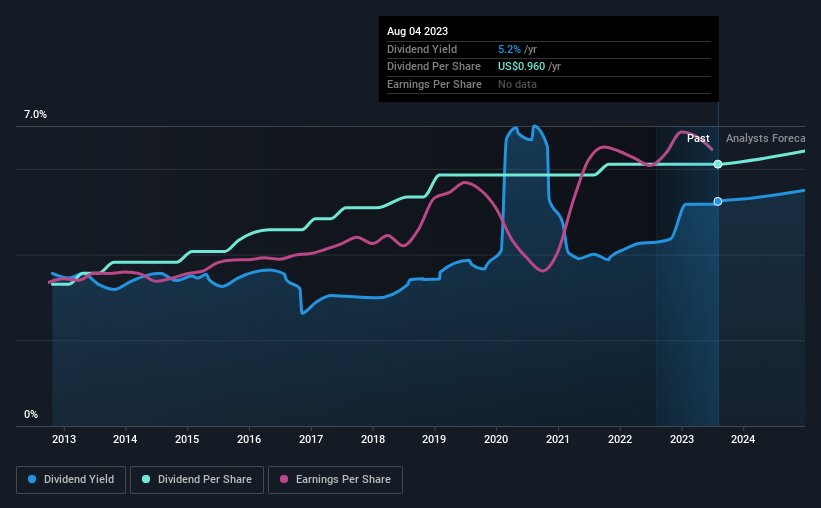There's A Lot To Like About Provident Financial Services' (NYSE:PFS) Upcoming US$0.24 Dividend
Regular readers will know that we love our dividends at Simply Wall St, which is why it's exciting to see Provident Financial Services, Inc. (NYSE:PFS) is about to trade ex-dividend in the next four days. The ex-dividend date occurs one day before the record date which is the day on which shareholders need to be on the company's books in order to receive a dividend. The ex-dividend date is an important date to be aware of as any purchase of the stock made on or after this date might mean a late settlement that doesn't show on the record date. Accordingly, Provident Financial Services investors that purchase the stock on or after the 10th of August will not receive the dividend, which will be paid on the 25th of August.
The company's next dividend payment will be US$0.24 per share. Last year, in total, the company distributed US$0.96 to shareholders. Based on the last year's worth of payments, Provident Financial Services has a trailing yield of 5.2% on the current stock price of $18.32. Dividends are an important source of income to many shareholders, but the health of the business is crucial to maintaining those dividends. As a result, readers should always check whether Provident Financial Services has been able to grow its dividends, or if the dividend might be cut.
Check out our latest analysis for Provident Financial Services
Dividends are typically paid from company earnings. If a company pays more in dividends than it earned in profit, then the dividend could be unsustainable. That's why it's good to see Provident Financial Services paying out a modest 43% of its earnings.
When a company paid out less in dividends than it earned in profit, this generally suggests its dividend is affordable. The lower the % of its profit that it pays out, the greater the margin of safety for the dividend if the business enters a downturn.
Click here to see the company's payout ratio, plus analyst estimates of its future dividends.
Have Earnings And Dividends Been Growing?
Businesses with strong growth prospects usually make the best dividend payers, because it's easier to grow dividends when earnings per share are improving. Investors love dividends, so if earnings fall and the dividend is reduced, expect a stock to be sold off heavily at the same time. With that in mind, we're encouraged by the steady growth at Provident Financial Services, with earnings per share up 8.4% on average over the last five years.
Another key way to measure a company's dividend prospects is by measuring its historical rate of dividend growth. Provident Financial Services has delivered 6.3% dividend growth per year on average over the past 10 years. It's encouraging to see the company lifting dividends while earnings are growing, suggesting at least some corporate interest in rewarding shareholders.
Final Takeaway
Should investors buy Provident Financial Services for the upcoming dividend? Provident Financial Services has seen its earnings per share grow slowly in recent years, and the company reinvests more than half of its profits in the business, which generally bodes well for its future prospects. We think this is a pretty attractive combination, and would be interested in investigating Provident Financial Services more closely.
Wondering what the future holds for Provident Financial Services? See what the four analysts we track are forecasting, with this visualisation of its historical and future estimated earnings and cash flow
If you're in the market for strong dividend payers, we recommend checking our selection of top dividend stocks.
Have feedback on this article? Concerned about the content? Get in touch with us directly. Alternatively, email editorial-team (at) simplywallst.com.
This article by Simply Wall St is general in nature. We provide commentary based on historical data and analyst forecasts only using an unbiased methodology and our articles are not intended to be financial advice. It does not constitute a recommendation to buy or sell any stock, and does not take account of your objectives, or your financial situation. We aim to bring you long-term focused analysis driven by fundamental data. Note that our analysis may not factor in the latest price-sensitive company announcements or qualitative material. Simply Wall St has no position in any stocks mentioned.

